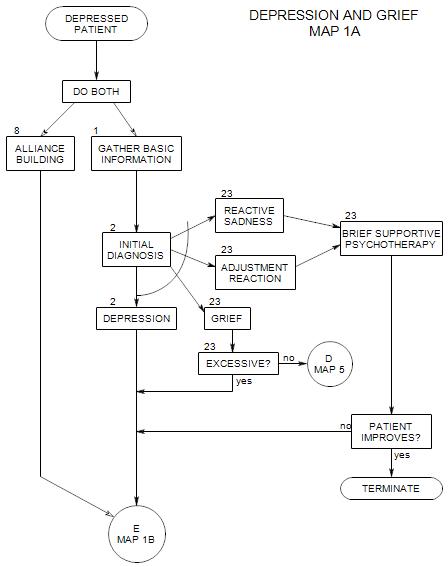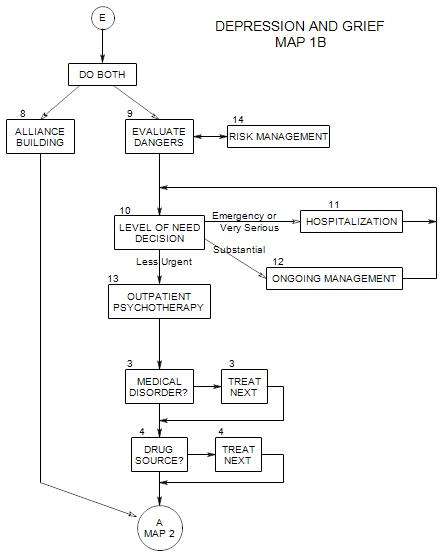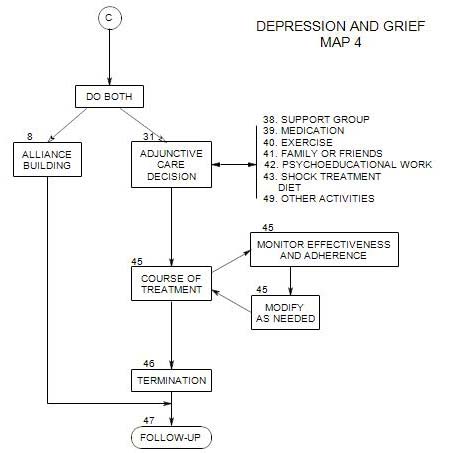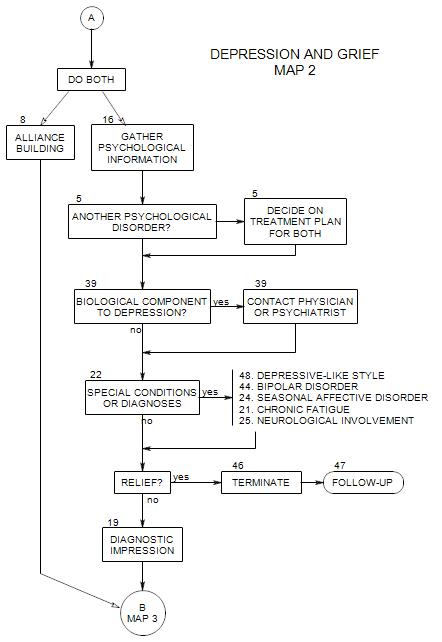
SECTIONS: 5 | 8 | 16 | 19 | 21 | 22 | 24 | 25 | 39 | 44 | 46 | 47 | 48
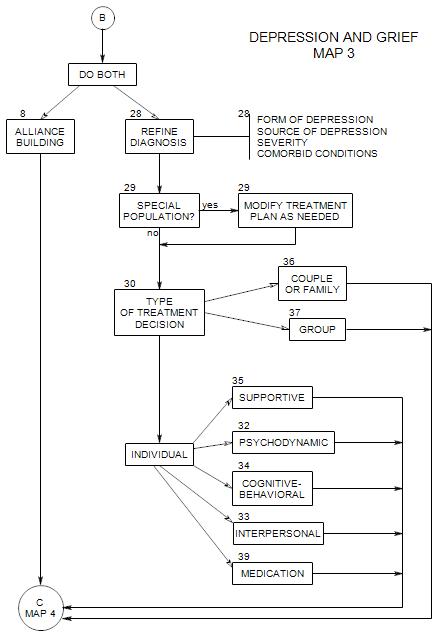
SECTIONS: 8 | 28 | 29 | 30 | 32 | 33 | 34 | 35 | 36 | 37 | 39
-
Follows Section 22 on Map 2
How you understand depression and what you look for as characteristics of depressed people depend in part on your theoretical point of view. The following are related to various forms of treatment discussed in Sects.32-37.
19a. Defenses
A person’s defenses can affect both the awareness of depression and the ability to deal with stresses that can otherwise lead some people to be depressed.
INTROJECTION
A person may direct thoughts or feelings toward him/herself that would more appropriately be directed outward. When those thoughts or feelings are negative, angry or critical, there may be no good defense against them (How could there be? They’re inappropriate.) The person’s self-esteem suffers, and he/she becomes hopeless and depressed.
In an alternative but similar view, introjection may be seen as a misperception of something external as being internal (McWilliams, 1994).
In the object relations meaning of the term, one introjects or internalizes by taking in aspects or qualities of another person. If introjection follows object loss, then it may be accompanied by feelings of loss and sadness. If the person whose qualities are introjected was or is depressed, then depression may be introjected as well.
TURNING AGAINST THE SELF
Here, negative thoughts and feelings about another person are judged to be too dangerous, and are therefore re-directed against the self.
Thus, depression can be a result of (1) being angry at someone else, (2) judging that anger to be dangerous, and (3) making an excuse for the other person that explains his/her behavior as a consequence of one’s own flaws or bad deeds. One then (4) blames oneself, leading to depression because of one’s own flaws or limitations.
This might especially happen if the other person is a primary caretaker, a person above reproach, or someone quick to retaliate in frightening ways.
IDEALIZATION
This defense can contribute to a person’s depression in several ways. To the extent that others are idealized, …
- One’s self tends to be devalued by comparison.
- The other can more easily disappoint.
- One’s expectation of self may become impossibly high, leading to disappointment in oneself.
REPRESSION OR DENIAL
In denial, a person denies the existence of something despite solid evidence for it. If that thing plays a part in the person’s everyday life, he/she may be repeatedly caught off-guard and unprepared. (Blackman, 2004, pp. 22-23) In repression, the thought associated with an affect is made unconscious. In this case, the person has no way to understand his/her own feelings, and often fabricates explanations for them. (Blackman, 2004, pp. 33-34] These defenses may contribute to a person’s depression, in that if certain long-standing personality issues are denied or repressed, the person is depleted and unable to manage life effectively.
e.g.: a history of trauma or neglect may naturally lead to feelings of vulnerability, anger, fear, sadness. A person who denies either the history or the consequences may have to restrict his/her activities in order to deal with life, and be chronically depressed and depleted as a consequence.
INTELLECTUALIZATION
A person can intellectualize, lose track of his/her feelings, not know what is the matter, life slips away, and he/she doesn’t realize that he/she is depressed.
ISOLATION OF AFFECT
SECONDARY GAIN
When a person is depressed, others may be especially careful or solicitous of that person. This may be more true of milder depressions.
19b. Personality Traits
19c. Personality Disorders
The following are quick sketches corresponding to early impressions of a patient. The DSM is also useful at this level of diagnosis.
BORDERLINE PERSONALITY [DSM diagnosis: 301.83]
A person who fits this diagnosis has more primitive and extreme reactions than other people. He/she may be at greater risk because of splitting [black-and-white thinking] and the extremes of mood swings. May be some risk of misdiagnosis as bipolar. Danger of feeling misunderstood and leaving treatment prematurely. Danger of becoming so depressed as to decompensate. Could lead you to involve other family members early on, and/or make a quick psychiatric referral for possible medication or hospitalization.
DEPENDENT PERSONALITY [DSM: 301.6]
Can use the depression for secondary gain of justifying greater attachment and dependency on others. This kind of person may make a quick attachment to the therapist, which is both diagnostic and useful in beginning the treatment. Presents special dangers to a therapist, in defining boundaries and limits that are reasonable without being hurtful. These patients can have strong fear and rejection reactions to changes of appointment time, therapist vacations, etc. Could lead you to be especially concerned, solicitous and careful, with some risk to patient autonomy.
NARCISSISTIC PERSONALITY [DSM: 301.81]
DEPRESSIVE PERSONALITY
HYSTERICAL PERSONALITY [DSM 301.50]
OBSESSIVE-COMPULSIVE PERSONALITY [DSM: 301.4]
19d. Object Relations
SENSITIVITY TO REJECTION
19e. Internal Conflicts
Often depression follows from insuperable internal conflicts, in which the person feels an urgent need to choose, coupled with an inability to make the choice.
Theoretically, internal conflicts may be viewed in a variety of ways:
- in learning theory terms, approach-avoidance or double avoidance conflicts
- in psychoanalytic theory, id-superego or superego-superego conflicts
Kinds of conflicts:
- A patient may be faced with a single overwhelming conflict, be unable to make it, and be depressed as a consequence.
- A patient may have already made an untenable choice and be unable to live with the consequences [eg: the movie Sophie’s Choice].
- A patient may have made a mistaken choice and be unable to live with the consequences.
- A patient may often end up in overwhelming and untenable choices. For example, the job of an emergency medical technician may lead to “burnout” and depression because of having to make these kinds of choices.
19f. Anxiety
Anxiety is a common accompaniment of depression, to the point that it is often difficult to decide which affect is primary or which is in greater need of attention.
